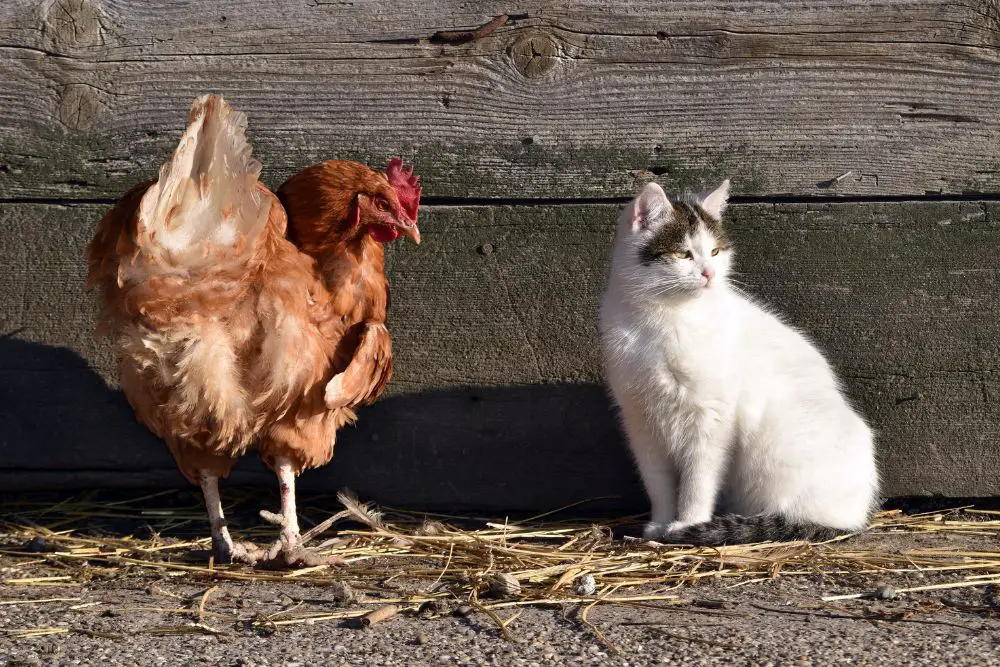Cats generally don't kill adult chickens or pullets due to their sharp beaks, spurs and toenails but are likely to kill baby chicks who are mostly defenceless. That said, they are many things you need to consider before raising cats together with fully-grown roosters or hens.
This article takes a closer look at when cats attack chickens and what you should do to keep your flock safe.
Table of Contents
Cats Usually Kill Chicks, Not Chickens
As we’ve already mentioned, cats do not normally kill full-grown chickens. Cats are very intelligent. They know that chickens are endowed with sharp beaks, spurs, and toenails, so for them, it’s better safe than sorry.
The problem with cats and chickens comes when you have young chicks. Cats will always want to hunt or play with small chicks, viewing them as some small irresistible snacks.
Your house cat may be the cutest thing you’ve ever had, but they have natural hunting instincts and a strong prey drive like other predators.
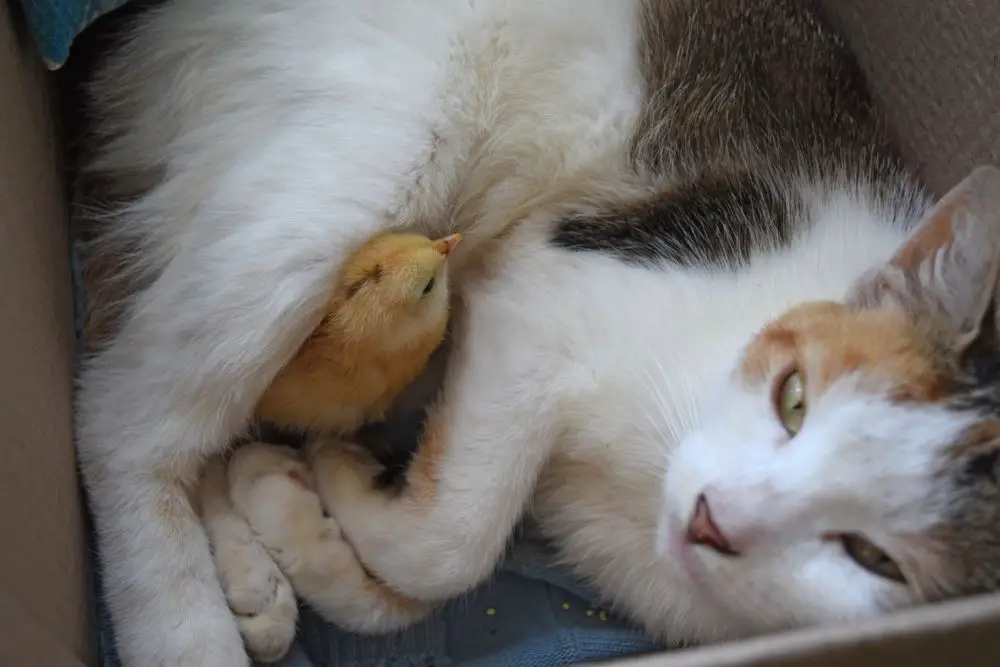
Cockerels and pullets cannot fight back as well as fully grown roosters and laying hens, so they are at a greater risk of being injured or killed. You should not allow your baby chicks to share a meal with Fluffy!
Cats Naturally Stalk Chickens
Cats can be compatible with chickens, although stray cats and feral cats pose a greater threat to young chickens and adult chickens alike.
However, house cats may still view younger chickens and baby chicks as their meal. They might even stalk full-grown chickens from smaller breeds like bantams.
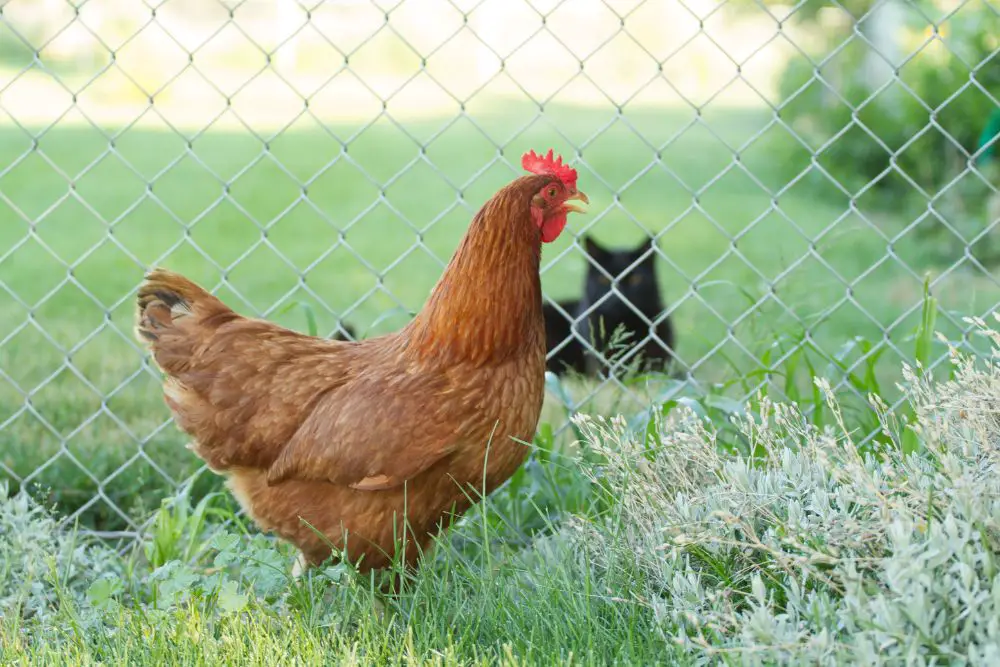
Fortunately, most chickens are large birds with sharp beaks, spurs, and claws which is generally enough to defend themselves if a cat decides to pounce on them. Roosters will often come to the rescue of a hen who’s under attack.
Provided your cat has enough food, they won’t risk these injuries. Cats will normally only attack chickens if they don’t have any other source of food, or if the chicken decides to attack first.
If you find a cat routinely stalking your flock of chickens, it may be time to provide your chickens with proper coop protection.
Cats and Their Behavior Around Chickens
The first thing to consider is the kind of cat involved, as a cat’s living conditions have a significant impact on their temperament and behavior.
House Cats
Most house cats are well pampered and fed so they are unlikely to attack chickens.
Additionally, the large size, sharp claws, and beak of an adult chicken are enough to ward off the average house cat. Cats will usually go for small prey like grasshoppers, mice, moles, and wild birds.
Outdoor Cats
If your cat loves the outdoors the most, it can pose a greater risk to your free-range chickens in the backyard garden. Outdoor cats are generally slim and fast, so they can attack larger prey.
Fortunately, most breeds of chicken are still large enough to defend themselves against feline attacks. Outdoor cats would prefer to take on smaller prey like moles, mice, wild birds – or even snakes at times!
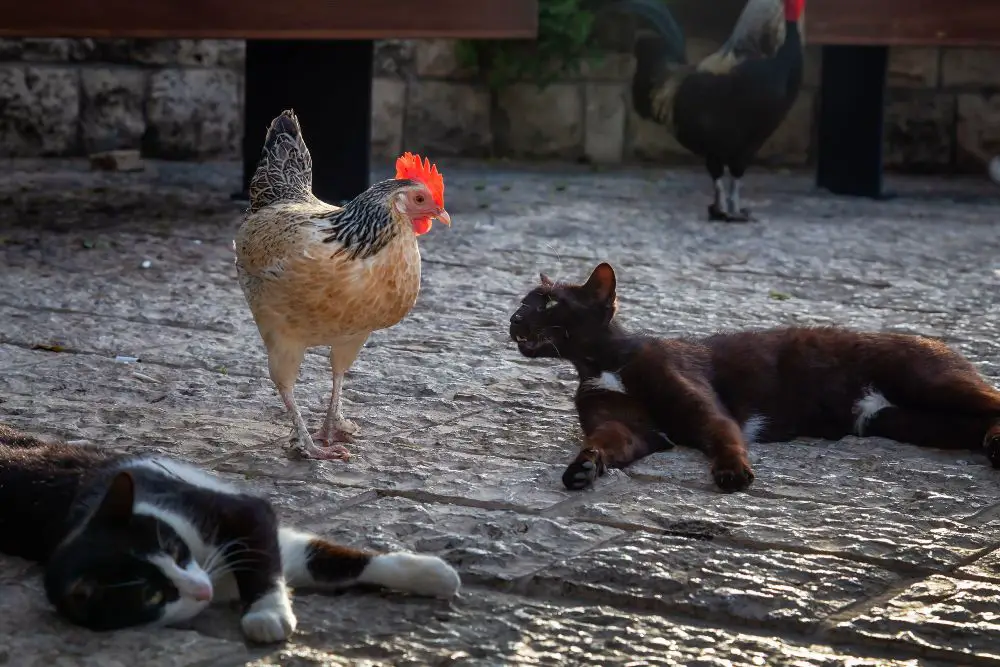
If you’re concerned about the presence of your neighbors’ cats on your property, it’s best to keep the younger chickens and baby chicks in a safe enclosure. These cats WILL stalk chickens they want to attack.
Stray Cats or Feral Cats
Stray cats and feral cats pose a huge threat to chickens (and many native wildlife) since they always hunt for their food. Wild cats are generally slim, quick, stealthy and are always chasing the next meal so they may kill chickens for food.
How To Protect Your Flock
Fortunately, there are several things you can do to protect your chickens and baby chicks from potential feline attacks:
- Keep them in sturdy coops: This will make it more difficult for domesticated and wild cats to kill your chickens, provided the enclosure has a roof and high-quality chicken wire.
- Put a roof for the chicken run: A secure roof for a chicken run will prevent risk-taking cats from climbing over the top.
- Ensure your cat is well fed: If your cat’s stomach is full, it has little reason to attack your chickens.
- Provide your house cat with toys: Cat toys can help keep your feline companion entertained and away from your flock.
- Keep your cat inside: Keeping your house cat indoors at all times will help lower the chances of them not just attacking your young chicks or adult chickens, but native wildlife too.
FAQs
Do cats eat chickens?
Yes! cats do eat chickens. In fact, some cat and chicken owners claim that their cats pose a greater risk to their chickens than other predators.
Like other predators, cats have natural hunting instincts even if they seem friendly to chickens and other animals in your home.
Cats don’t usually prey on full-grown chickens because they aren’t dumb! They know chickens are large enough to defend themselves. They usually kill small prey like mice, moles, and small birds.
Can I raise chickens if I have a cat?
Yes, you can with many families raising both chickens and cats together. Many report that their house cats have no issue with their chickens.
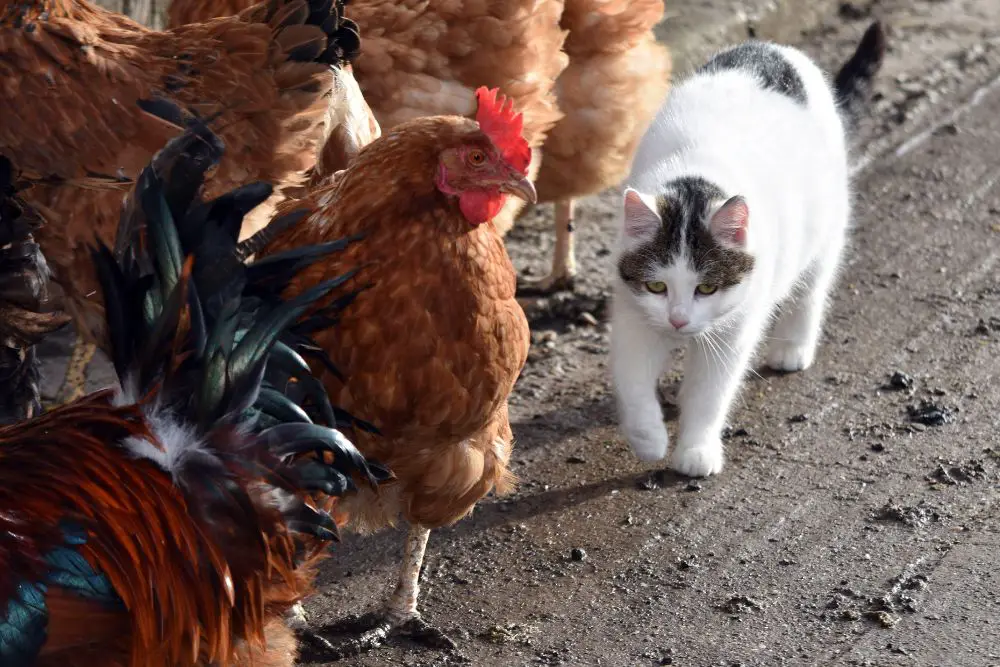
Do supervise their interactions to ensure your cat doesn’t attack chickens. Sometimes the cat may be unable to fight against its inner instincts, and he might attack small chickens.
If you keep your chickens in a sealed-off place, then everyone should be fine.
It’s also advisable to introduce your cat to chickens while it is still a kitten. That way, the cat will get used to chickens and learn not to attack them.
Are there any benefits to raising chickens and cats together?
There are three main benefits to raising chickens and cats together:
- Cats can help catch rodents or mice that go for chicken feed. Having fewer rodents or mice means less attraction for snakes that feed on mice and other rodents, but might also turn to your flock for an easy meal in the early hours of the morning.
- Your cat may defend their own territory against other neighborhood cats. This naturally provides some protection to your flock in the process.
- Cats are also a deterrent to small wild birds, which could bring lice, mites, and diseases to your chickens. Cats enjoy chasing away the wild birds and your birds are less likely to suffer from diseases. It’s a win-win situation!

